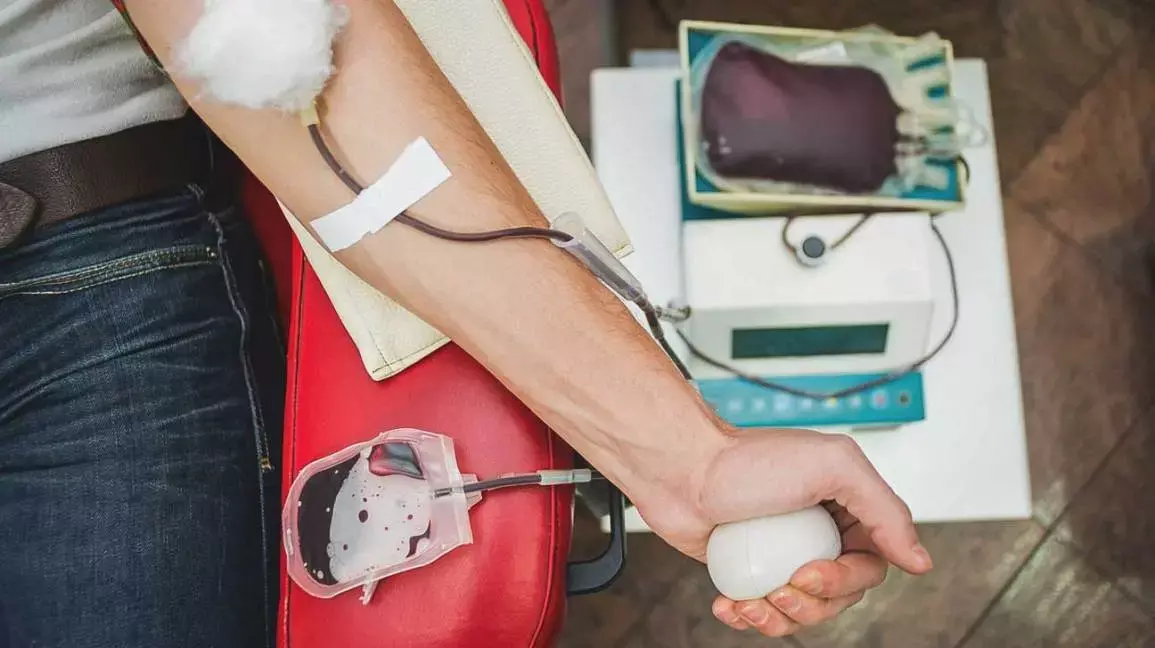- Home
- Medical news & Guidelines
- Anesthesiology
- Cardiology and CTVS
- Critical Care
- Dentistry
- Dermatology
- Diabetes and Endocrinology
- ENT
- Gastroenterology
- Medicine
- Nephrology
- Neurology
- Obstretics-Gynaecology
- Oncology
- Ophthalmology
- Orthopaedics
- Pediatrics-Neonatology
- Psychiatry
- Pulmonology
- Radiology
- Surgery
- Urology
- Laboratory Medicine
- Diet
- Nursing
- Paramedical
- Physiotherapy
- Health news
- Fact Check
- Bone Health Fact Check
- Brain Health Fact Check
- Cancer Related Fact Check
- Child Care Fact Check
- Dental and oral health fact check
- Diabetes and metabolic health fact check
- Diet and Nutrition Fact Check
- Eye and ENT Care Fact Check
- Fitness fact check
- Gut health fact check
- Heart health fact check
- Kidney health fact check
- Medical education fact check
- Men's health fact check
- Respiratory fact check
- Skin and hair care fact check
- Vaccine and Immunization fact check
- Women's health fact check
- AYUSH
- State News
- Andaman and Nicobar Islands
- Andhra Pradesh
- Arunachal Pradesh
- Assam
- Bihar
- Chandigarh
- Chattisgarh
- Dadra and Nagar Haveli
- Daman and Diu
- Delhi
- Goa
- Gujarat
- Haryana
- Himachal Pradesh
- Jammu & Kashmir
- Jharkhand
- Karnataka
- Kerala
- Ladakh
- Lakshadweep
- Madhya Pradesh
- Maharashtra
- Manipur
- Meghalaya
- Mizoram
- Nagaland
- Odisha
- Puducherry
- Punjab
- Rajasthan
- Sikkim
- Tamil Nadu
- Telangana
- Tripura
- Uttar Pradesh
- Uttrakhand
- West Bengal
- Medical Education
- Industry
Fixed-dose darbepoetin use as good as titration based use to minimize transfusions in CKD

Erythropoietin-stimulating agents (ESAs) have historically been titrated to achieve a predefined haemoglobin concentration when treating patients with CKD and anaemia.
In a study, researchers found no evidence of differences in the incidence of red blood cell transfusion for a titration-dose strategy versus a fixed-dose strategy for darbepoetin. The study findings were published in the Journal Of The American Society Of Nephrology on January 29, 2021.
Exposure to high doses or a high cumulative dose of ESAs may contribute to cardiovascular events in patients with CKD and anaemia. However, it is unknown whether an alternative dosing strategy might reduce the need for red blood cell transfusions, mitigate potential factors contributing to the increased cardiovascular risk associated with the use of high ESA doses, and decrease cumulative dose exposure. Therefore, Robert Toto and his team conducted a study to describe the benefits and potential risks of a new treatment strategy, using a low fixed dose of darbepoetin alfa compared with a haemoglobin-based, titration-dose algorithm.
Strategies using Darbepoetin Alfa to Avoid Transfusion in Chronic Kidney Disease (START-CKD) study was a phase 3, multicenter, randomized, double-blind, parallel-group study of 756 adults with stage-3 to -5 CKD and anaemia. Among 756 patients, 379 patients were randomized to the fixed-dose group and 377 to the titration-dose group. Over 2 years, similar proportions of both groups were transfused: 24.1% fixed-dose group vs 24.4% titration-dose group, with no difference in time to the first transfusion. Participants received transfusions as deemed necessary by the treating physician.
Key findings of the study were:
- Upon analysis, the researchers found that the titration-dose group achieved significantly higher median haemoglobin (9.9 g/dl) compared with the fixed-dose group (9.4 g/dl).
- They also found that the fixed-dose group had a significantly lower median cumulative dose of darbepoetin (median monthly dose of 30.9 µg) compared with the titration-dose group (53.6 µg median monthly dose).
- This difference, however, was balanced by a significantly lower median cumulative exposure to the ESA in the fixed-dose rather than titrated-dose group: median monthly dose 30.9 vs 53.6 µg, respectively, with a between-group difference of -22.1 µg.
The authors concluded, "These findings indicate no evidence of difference in incidence of red blood cell transfusion for a titration-dose strategy versus a fixed-dose strategy for darbepoetin. This suggests that a low fixed dose of darbepoetin may be used as an alternative to a dose-titration approach to minimize transfusions, with less cumulative dosing."
For further information:
https://jasn.asnjournals.org/content/32/2/469
Dr Kartikeya Kohli is an Internal Medicine Consultant at Sitaram Bhartia Hospital in Delhi with super speciality training in Nephrology. He has worked with various eminent hospitals like Indraprastha Apollo Hospital, Sir Gangaram Hospital. He holds an MBBS from Kasturba Medical College Manipal, DNB Internal Medicine, Post Graduate Diploma in Clinical Research and Business Development, Fellow DNB Nephrology, MRCP and ECFMG Certification. He has been closely associated with India Medical Association South Delhi Branch and Delhi Medical Association and has been organising continuing medical education programs on their behalf from time to time. Further he has been contributing medical articles for their newsletters as well. He is also associated with electronic media and TV for conduction and presentation of health programs. He has been associated with Medical Dialogues for last 3 years and contributing articles on regular basis.
Dr Kamal Kant Kohli-MBBS, DTCD- a chest specialist with more than 30 years of practice and a flair for writing clinical articles, Dr Kamal Kant Kohli joined Medical Dialogues as a Chief Editor of Medical News. Besides writing articles, as an editor, he proofreads and verifies all the medical content published on Medical Dialogues including those coming from journals, studies,medical conferences,guidelines etc. Email: drkohli@medicaldialogues.in. Contact no. 011-43720751


